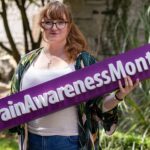GSK ‘Understanding Shingles’ research, conducted in Ireland, reveals over half of over-50s
- perceive shingles as a severe disease
- But more than four-in-10 (43%) feel they are unlikely to develop it in the next year, with
- research showing low awareness levels of the association with previous chickenpox infection
- Research also shows nearly one-fifth (19%) developed shingles, and over half (55%) know
- someone who was affected by condition
- Over four-in-10 believe it has ‘extremely negative’ impact on quality of life
Monday, 18 July 2022 – Broadcaster Teresa Mannion has called on the over-50s in Ireland to speak with their doctor, practice nurse or pharmacist about the risk factors for shingles and shingles prevention. New research conducted on behalf of GSK shows that almost one-fifth of respondents (19%) over-50 reported that they had experienced shingles and over half (55%) of those surveyed said they knew someone who was affected by it.
The GSK ‘Understanding Shingles’ research 1 looked at awareness levels, knowledge and perceptions of shingles among the over-50s in Ireland. Ms Mannion made the appeal because despite over half of respondents (56%) perceiving shingles to be a serious disease, a considerable number of respondents – 43% – said they felt it was unlikely that they would develop shingles over the next year.
Ms Mannion also urged the over-50s to find out about the risk factors as the GSK research shows that just 38% of respondents were aware that having previously had chickenpox means individuals are susceptible to developing shingles.
One-in-three people who have had chickenpox are at risk of developing shingles in their lifetime. 2, 3
While most people make a full recovery, shingles can potentially lead to serious and long-lasting complications. Post-herpetic neuralgia (PHN) is the most common complication, a prolonged nerve pain in the area affected by shingles that can last for months or even longer. 4 PHN occurs in around 20% of all shingles cases, with the over-50s particularly at risk. 5
The survey shows that 57% of respondents said they were extremely or somewhat knowledgeable about shingles and reveals good awareness of many of the main symptoms – including a red rash (76%), pain, burning, numbness or tingling in one part of the body (71%) and itching (55%). It also demonstrates that some of the main risk factors associated with shingles are well understood, with recognition of a weakened immune system (62%), being under stress (48%) and age-related declining immunity (47%). Additionally, 42% felt that shingles had an ‘extremely negative’ impact on quality of life.
Commenting on the research findings, Ms Mannion said: “I can speak from personal experience as I developed shingles and it really stopped me in my tracks. It can be a severely painful, debilitating condition, and it impacted my personal and professional life, so it is not to be taken lightly. I’m heartened to see that over half of the respondents believe shingles is a serious condition, but I’m also concerned that many of the over 50s don’t feel that they are at risk. As shingles has a broad range of risk factors, I’d advise anyone in that age group to contact their doctor, practice nurse or pharmacist to discuss options.”
Chair of Chronic Pain Ireland, Martina Phelan, added: “Shingles can be very painful. This pain is described as burning, shooting, stabbing or even constant unbearable itching. It does not happen to everyone, and it may only last for a few weeks, but some people can experience postherpetic neuralgia (PHN), a chronic condition that is difficult to treat and may cause pain for months, or longer. People don’t know as much as we’d like about shingles and there are many misconceptions.
We are pleased to be part of the Understanding Shingles campaign as we find shingles is not always taken as seriously as it should be.”
NP-IE-HZX-PRSR-220003
Date of preparation July 2022
General Practitioner Dr Bernard Ruane of Milltown Medical Centre, Kerry said: “I’ve seen the impact of shingles first-hand whilst working in Canada. We have an opportunity to significantly reduce the incidence of shingles in people who are aged 50 and older and in those aged 18 years and older who are at increased risk of developing shingles. I would urge those over-50 who’ve had chickenpox and people with a weakened immune system to make an appointment with their doctor, practice nurse or pharmacist to discuss what options are available to them to avoid shingles.”
Visit www.understandingshingles.ie to learn more about shingles.
ENDS
For more information, contact Richard Brophy, Edelman
083 300 2828
Notes to Editors
Research Methodology
Research into perceptions of shingles in Ireland was conducted by Ipsos MRBI on behalf of GSK. Fieldwork was carried out between 5 and 21 April 2022. 300 people aged between 50 and 70+ years participated in the online survey. Respondents were recruited to match national proportions in terms of region where they live, gender and working situation.
About Chronic Pain Ireland
Established in 1992, Chronic Pain Ireland is the national organisation providing information and support services to people living with chronic pain. Chronic Pain Ireland is a registered charity and works with all stakeholders including those living with chronic pain, their families and carers, health professionals, students, researchers, and others interested in chronic pain. For more information see: https://chronicpain.ie/
About GSK
GSK is a science-led global healthcare company. For more information, please visit www.gsk.com/about-us.
Registered in Ireland: GlaxoSmithKline (Ireland) Limited, a private company limited by shares.
Registered in Ireland with company number 15513.
Registered office: 12 Riverwalk, Citywest, Dublin 24
References
1 Data on file. Understanding Shingles survey conducted by Ipsos MRBI on behalf of GSK. April 2022.
2 Harpaz R, Ortega-Sanchez IR, Seward JF; Advisory Committee on Immunization Practices (ACIP), Centers for
Disease Control and Prevention (CDC). Prevention of herpes zoster: recommendations of the Advisory
Committee on Immunization Practices (ACIP). MMWR Recomm Rep. 2008 Jun;57(RR-5):1-30.
3 Brisson et al. Epidemiology of varicella zoster virus infection in Canada and the United Kingdom. Epidemiol.
Infect. (2001), 127, 305±314.
4 Johnson RW et al. Herpes zoster epidemiology, management, and disease and economic burden in Europe: a
multidisciplinary perspective. Ther Adv Vaccines. 2015;3(4):109–120.
5 National Health Service, 2021. Post-Herpetic Neuralgia. https://www.nhs.uk/conditions/post-herpetic-neuralgia.
Accessed June 2022.















